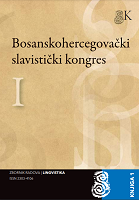Diskriminacija u jeziku:Istraživanja u BiH
Discrimination in Language – Research in Bosnia and Herzegovina
Author(s): Jasmina Čaušević, Sandra ZlotrgSubject(s): Gender Studies, Sociolinguistics, South Slavic Languages, Sociology of Culture
Published by: Slavistički komitet BiH
Keywords: critical linguistics; sex; gender; discrimination; language and ideology; political correctness; the changes from the bottom up; discourse and power; gender equality;
Summary/Abstract: Grammatically legitimate, a gender sensitive language is an important social and ideological matter that contributes to a greater visibility of women and women’s work. Social power is clearly reflected in a language, and rejection of the generic usage of masculine gender where women are not seen and heard but implied, is the first step to a more equal distribution of power. Despite progress in the relevant legislative solutions, under the pretext of language economics, language policy in BiH (and/or the lack of it) produces, supports, and perpetuates discrimination of women. Critical linguistics insists upon the idea that it is the language that constructs the reality in which a continuous struggle is led to impose a legitimate perception (standardization) that exclusively depends on the symbolic capital owned by its agencies (Pierre Bourdieu). In this respect, even those linguists who do not accept the thesis on language as symbolic capital speak of an increased interest for language and the study of its power in the ideological spheres (Marina Katnić-Bakaršić). Language is not a reflection of our gender, social status, or culture; it rather constructs our identities (Nirman Moranjak-Bamburać). Using feminine gender provides an identifying position to something subordinate and not already absorbed into the language, therefore the feminine gender suffixes -inja or -ica sound “unnatural” or “funny”. There exists, of course, freedom to select gender in utterances; however, opting for feminine gender significantly contributes to the annihilation of the discursive power that works in favor of the masculine gender (Biljana Kašić). While the generic use of titles and professions in masculine gender was until recently even legally justified, the fact that female students use masculine gender in their CVs to say that they are students, graduates, or Bosniak, and then state that their sex is “female”, only confirms our position that gender sensitive language planning and grassroots’ changes can alter our linguistic (thus, also social) reality. Our starting point is poststructuralist and we therefore avoided the terms of universal or correct that have long ago been deconstructed as constructs of Eurocentric ideological colonialism.
Journal: Bosanskohercegovački slavistički kongres
- Issue Year: I/2012
- Issue No: 1
- Page Range: 319-325
- Page Count: 7
- Language: Bosnian

